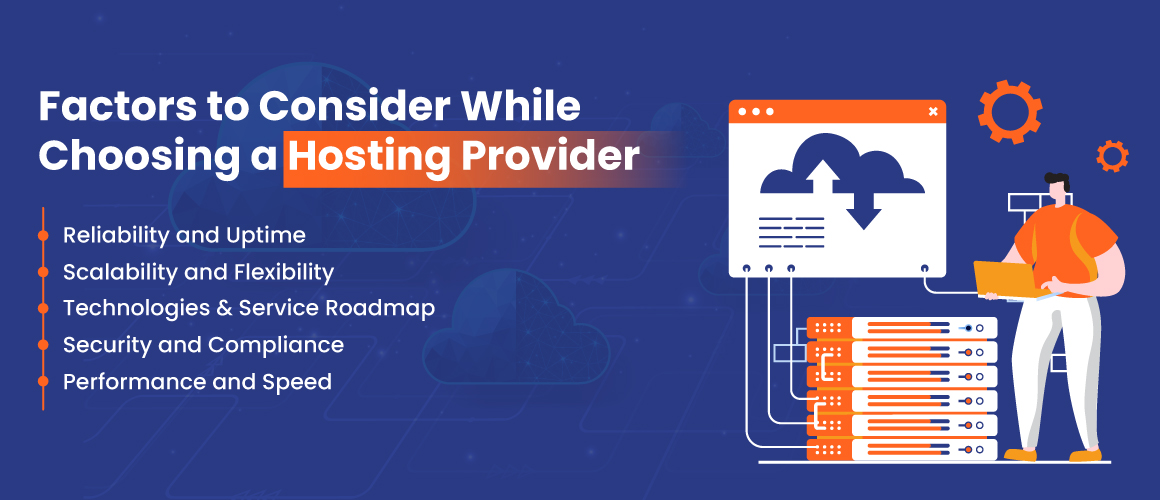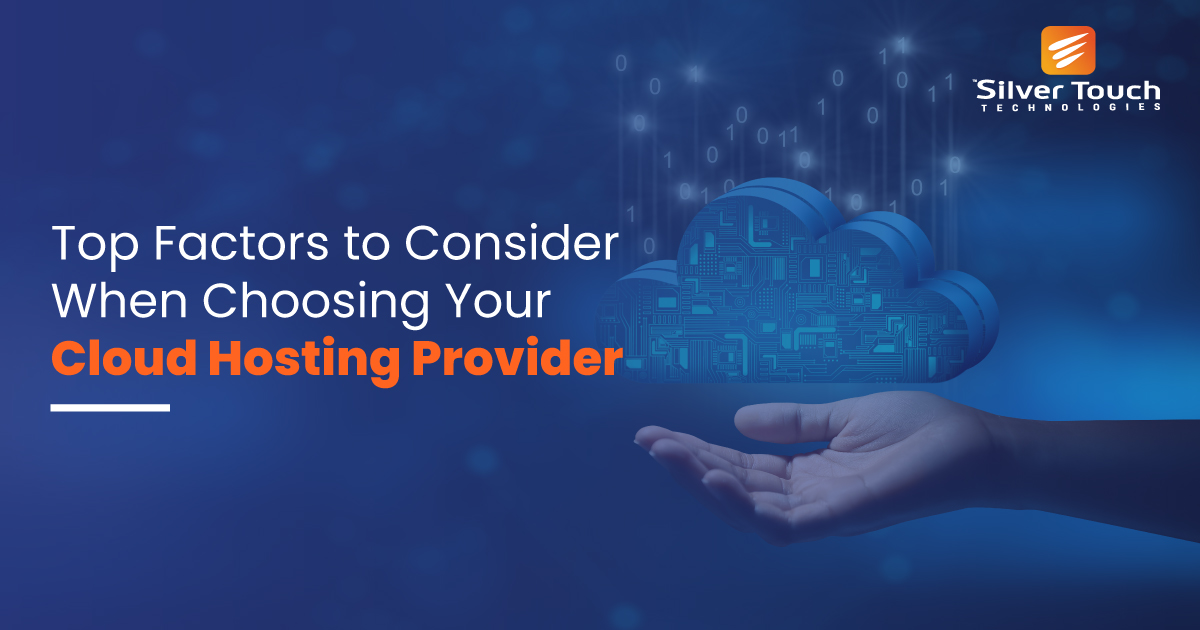Cloud technology has revolutionized all industry sectors by supporting the Industry 4.0 concept. This technology not only plays a vital role in improving IT operations but also acts as a catalyst for bringing digital transformation. Your company can leverage the benefits of cloud solutions simply by selecting the right cloud hosting providers.
The term ‘Cloud hosting provider’ is used for companies that offer all the necessary resources to various companies or businesses in the forms of IaaS, SaaS, and PaaS. These three service models can fulfill various complex and diverse requirements of modern businesses. We will delve into the major factors you should consider when selecting the best cloud hosting company.
Do you want to learn more about why it is necessary to select the right hosting provider for your company? Let’s discuss the role of a cloud hosting provider in brief.
Importance of choosing the right cloud hosting providers
A cloud hosting company can help you leverage the benefits of this amazing technology, but cheap cloud hosting providers can cost a lot in terms of data security, expenses, and infrastructure stability.
As per the Gartner prediction, over 95 percent of new digital workloads will be deployed on cloud-native platforms by 2025. The major reason behind this massive rise is the vast benefits and opportunities the cloud offers to modern enterprises. You can make the most of the cloud technology by choosing the right partner for cloud services.
Another research has revealed that many businesses find it difficult to leverage the benefits of the cloud because of a lack of optimization. When you choose the right cloud hosting provider, you can get rid of all the challenges in the way of deployment and access to cloud servers.
Let’s dig deep into the top factors you can keep in mind to ensure that you can select the best cloud hosting partner.
Top Factors to Consider When Choosing a Cloud Hosting Provider

These days, many cloud providers are available, but when it comes to selecting the right one, you need to make criteria according to your company’s unique and diverse requirements. Here we mention eight factors you can use to choose the right cloud services provider.
Reliability and Uptime
It starts with reliability and the capability to handle downtime. Cloud technology is highly reliable, however, we cannot say the same thing for any cloud hosting company. Therefore, it is essential to look at their storage and network capabilities and other related factors. It is also necessary to ask about the customer support and uptime they provide.
Every cloud provider has to deal with downtime at some point, but it is important to see how they handle this situation and resolve the issue soon. Better monitoring and backup capabilities can help cloud providers minimize downtime and keep them more trustworthy.
Scalability and Flexibility
Other important factors are the flexibility and scalability cloud providers can offer to their customers. As an entrepreneur, you always want a partner who can assist you to grow your business and is capable of scaling up their services as your business grows. For example, when it comes to moving more assets or data into a private cloud becomes essential as your business grows. The right cloud services provider should offer this scalability.
Along with this, the flexibility of choosing the most suitable cloud-based solution or service model is crucial for ensuring the growth of your business.
Technologies & Service Roadmap
It is always advisable to make sure that the cloud provider offers a robust platform and trending technologies in line with the market trends. Also, they should follow all the standards while offering high-quality cloud services. Many cheap cloud hosting providers claim to offer comprehensive cloud packages at reduced rates, but they may use outdated technologies. It can cost you a lot in the future.
Moreover, many service providers offer the facility of migration to the cloud and other services. They can also help you make a cloud roadmap for your company. Your business may need these services moving forward, and therefore, you can select any of these providers.
Security and Compliance
In today's complex regulatory environment, it is essential to ensure that your cloud hosting partner complies with industry-recognized compliance standards and frameworks. Ask the provider for their compliance licenses and certificates, especially ISO 27001. You should also check if they are DMTF, RDS CAL, and PCI DSS compliant.
When it comes to cloud security, you need to assess all the security parameters that the cloud hosting company provides. Some of the essential security mechanisms you should check are certified firewalls, multilayer security, multi-factor authentication, and data encryption for both data in transit and data at rest.
Performance and Speed
Businesses need their applications and websites to be up and running quickly and reliably in the digital world. If a cloud provider fails to deliver the performance and speed you need, it can have a negative impact on your business. Seamless performance and high speed are necessary to increase customer satisfaction and reduce financial losses that occur due to a sluggish app or website.
You should ask about performance and speed guarantees when evaluating cloud service providers. You can test the performance of the provider's services by finding latency and measuring throughput and availability. before making a decision.
You May Also Like: Multi-Cloud Strategy- Advantages, Challenges, and Best Practices
Customer Support and Service Level Agreements (SLAs)
Customer support is essential because it ensures that you have someone to get assistance when you face any problems with your cloud hosting services. A good customer support team will be able to help you troubleshoot problems quickly and efficiently. They should also be able to answer your questions about cloud hosting services and provide you with support documentation.
SLAs (Service Level Agreements), on the other hand, are necessary for defining the level of service that you can expect from your cloud hosting provider. An SLA will typically include uptime guarantees, data retention policies, and response times for customer support tickets.
Pricing and Cost Efficiency
You need to make sure that you are getting good value for your money when you select the cloud services partner. It is better to consider the long-term costs of cloud hosting, such as the cost of storage and bandwidth. Cost-efficient cloud hosting and other services can make long-term savings possible. Also, you can get the benefits of affordability and flexibility from a hosting partner with a good pricing policy.
By considering the factors above, you can select a cloud hosting company that offers a custom and comprehensive solution that saves money.
Migration Support, Vendor Lock-in & Exit Planning
Vendor lock-in is a specific period given by the vendor or service providers during which the customer cannot transition easily to a competitor. It is usually an outcome of proprietary technologies vendors use that remain incompatible with those offered by competitors. Cloud services largely depend on proprietary components, and therefore, vendor lock-in is common.
However, you can understand the conditions and circumstances of exit along with migration support and exit planning. You can select a cloud service partner who uses proprietary technology at a minimum level so that you can get a seamless exit if necessary.

Conclusion
The cloud offers many benefits to enterprises of all sizes. You can easily optimize IT infrastructure without spending a small fortune with the help of cloud solutions. However, you need to select the best cloud hosting provider to meet this objective and increase the efficiency of your business processes. Hope these eight tips will remain useful to select the right cloud partner for your upcoming projects.
Silver Touch Technologies is one of the best cloud hosting providers in India. We take a holistic approach and consider all the aspects of your business while offering you a customized cloud hosting plan. Let’s discuss your company’s cloud requirements and make a roadmap to digital transformation with cloud technology. Simply mail us at info@silvertouch.com and we will get back to you right away!
FAQs
What is the difference between cloud and hosting services?
Cloud computing is a general term for the delivery of hosted services over the Internet. This includes a broad range of services, such as computing, storage, networking, databases, software, analytics, and intelligence. Hosting services, on the other hand, are more specific and typically refer to the provision of storage and computing resources for websites and web applications.
What is the purpose of cloud hosting?
Cloud hosting is a type of web hosting that uses cloud computing to store and deliver web content.
How much does average cloud hosting cost?
The average cost of cloud hosting depends on a number of factors, including the type of cloud hosting you choose, the amount of storage and bandwidth you need, and the features you require. However, you can expect to pay between $5 and $50 per month for basic cloud hosting services.
Is cloud better than server?
The average cost of cloud hosting in India varies depending on the type of cloud hosting you choose, the amount of storage and bandwidth you need, and the features you require. However, you can expect to pay between ₹100 and ₹500 per month for basic cloud hosting services.
How do I choose a cloud server?
Here are some factors to consider when choosing a cloud server
- Budget
- Needs
- Requirements
- Location
- Provider



